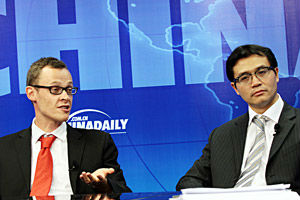Syria showdown triggers concern over Asian pivot
Updated: 2013-09-04 10:45
By Chen Weihua in Washington (China Daily)
|
||||||||
The impending US military action against Syria, which indicates that the superpower might continue its entanglements in the Middle East, has raised questions about the US' pivot to Asia strategy.
The White House said on Tuesday that President Barack Obama called Japanese Prime Minister Shinzo Abe on Monday evening to discuss their grave concerns about the use of chemical weapons in Syria on Aug 21.
"They pledged to continue to consult closely on possible responses by the international community," the White House statement said.
In the phone call, the two leaders also reaffirmed the critical role of the US-Japan alliance for the peace and stability of the Asia-Pacific.
"They stressed their shared commitment to taking steps to further enhance security cooperation on regional and global challenges, and to continue implementing our shared plan for US force posture realignment in Japan," the statement said.
Michael Auslin, a resident scholar and director of Japan studies at the American Enterprise Institute, a conservative think tank in Washington, believes the crisis in Syria shows that the Asia pivot is rhetorical.
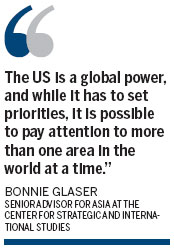
"While the administration was claiming a new era in US foreign policy, the ghosts of crises past continue to disturb Mr Obama's dreams," Auslin wrote in the Wall Street Journal on Monday. "Renewed violence in Iraq and the complexities of not losing all gains in Afghanistan after the withdrawal of US troops in 2014 were perhaps highest on the list of unfinished business. Yet more concerning were the brewing crises: Iran's continued pursuit of nuclear weapons and the bloody Syrian civil war."
Auslin described the real world intrusions of failing US diplomacy as spelling trouble for Obama's pivot. "It is entirely likely that long-term deployment of Pacific-based units to the Middle East could be needed to ensure that Syria's war does not spill over," he said.
Auslin believes that the Syrian issue will further fuel China's distrust of the US' strategic intentions.
He said Syria shows that Obama is stretched in keeping both promises and commitments around the world. "Far from making Asia more stable, the pivot may well wind up alienating both friends and competitors alike," he said.
Bonnie Glaser, senior advisor for Asia at the Center for Strategic and International Studies, disagreed that the Syria crisis will distract the US from its Asia pivot strategy.
- US Senate panel reaches deal on draft authorization on Syria
- Obama wins key congressmen's backing on Syria strike
- US support for military strike on Syria is low
- Beware of terrorist groups in Syria
- Syria debate 'is about the world's red line': Kerry
- US Marines website hacked by pro-Syria hackers
- China on Syria: Follow the rules
- France not to vote on Syria in parliament
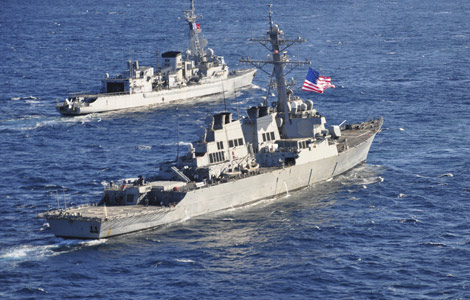
 US missile destroyers stand by in Mediterranean
US missile destroyers stand by in Mediterranean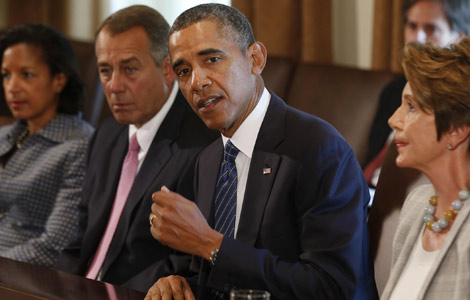
 Obama wins key backing on Syria strike
Obama wins key backing on Syria strike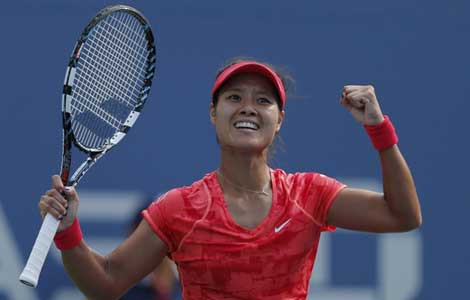
 The first Chinese to reach US Open semi-final
The first Chinese to reach US Open semi-final
 Photos: Daily life for Free Syrian Army
Photos: Daily life for Free Syrian Army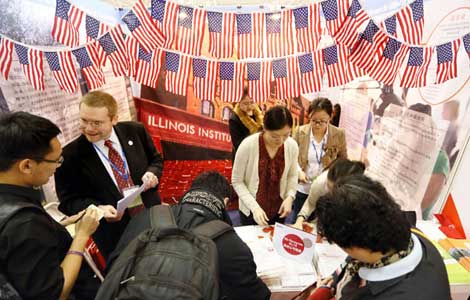
 Fewer Chinese students apply to US graduate schools
Fewer Chinese students apply to US graduate schools
 Technology transfer is a focus
Technology transfer is a focus
 Syrian refugees exceed 2m
Syrian refugees exceed 2m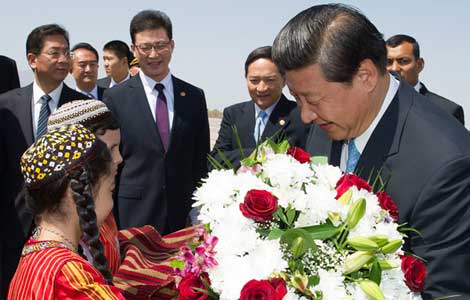
 Energy partners boost gas supplies
Energy partners boost gas supplies
Most Viewed
Editor's Picks

|

|

|

|

|

|
Today's Top News
New UN envoy takes seat amid Syrian turmoil
Hainan starts Chicago-Beijing direct
Kodak emerges from bankruptcy
Senate agrees on draft authorization on Syria
Local debts not to drag China into financial crisis
Police name attacker who took boy's eyes
Fewer Chinese apply to US graduate schools
Japan urged to face history
US Weekly

|

|

